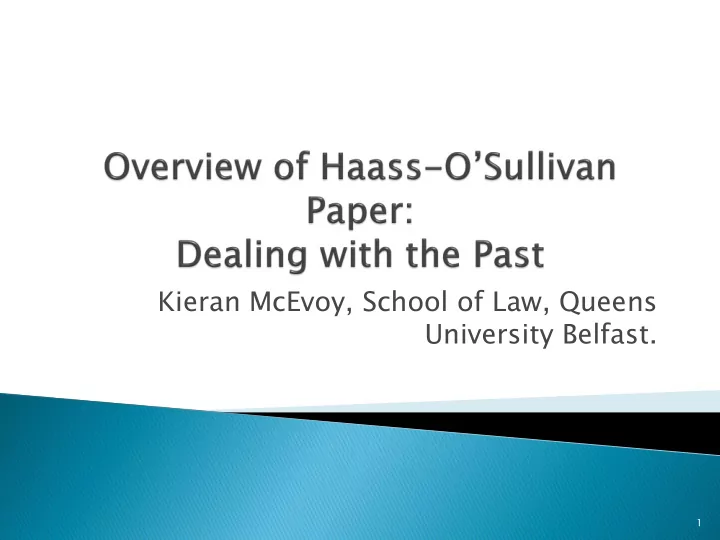

Kieran McEvoy, School of Law, Queens University Belfast. 1
May 2013 strategy, Together: Building a United Community called for creation of a Panel of the Parties of NI Executive Parties invited Haass and O’Sullivan to chair TOR required Panel to “Bring forward a set of recommendations by the end of 2013 on [1] parades and protests; [2] flags, symbols, emblems and [3] related matters stemming from the past …” Panel received over 600 submissions and held 100 meetings with 500 people Seven drafts of the document were produced No agreement reached. Final draft has been published by NI Executive Available http://www.northernireland.gov.uk/news- ofmdfm-311213-haass-document-published 2
Haass- O’Sullivan is the latest in series of efforts to deal with the past Elements of the Good Friday Agreement 1998 were ‘past facing’ but no ‘overarching mechanism’. A ‘piecemeal approach to the past’. E.g.. Bloody Sunday and Cory Inquiries, De Silva, HET, OPONI, Inquests, civil actions, prosecutions etc. Three efforts to ‘pull it all together’ Healing Through Remembering 2006 Consultative Group on the Past 2009 The Haass- O’Sullivan Negotiations 2013 3
4
NI society remains divided, 15 years post- GFA Divisions are causing political instability and civil unrest Promises made in our peace agreements have not been fully delivered Members of society are still ‘struggling’ with needs resulting from the conflict Passage of time adds urgency to these proposals 5
Most substantial part of the proposals (19 pp) Five key elements: ◦ (i) Support for victims and survivors ◦ (ii) Acknowledgement ◦ (iii) Historical Investigations Unit ◦ (iv) Independent Commission for Information Retrieval (inc. themes unit) ◦ (v) Narratives and Archives 6
Outlines the continuing harms experienced by victims and survivors Welcomes CVS review of the Victims and Survivors Service ◦ Calls for CVS to establish a Mental Trauma Service ◦ Also calls on CVS to consider the needs of the injured Noted that the parties could not reach agreement on who could be considered a ‘victim’ 7
Acknowledgement as a foundation step for dealing with the past. Blame for the past is not equally shared in society but rather than particular burdens rest on those (whether state or paramilitary actors) who acted beyond the rule of law Acknowledgement requires more than saying sorry. It requires; an unqualified acceptance of responsibility; ◦ ◦ an expression of the human consequences of past violence ◦ a sincere expression of remorse Encourage individuals, organisations and governments to work together on coordinating acknowledgement statements Hope acknowledgement by leaders will encourage others to participate in information retrieval 8
Legislation to establish a HIU IU to replace HET and the historical unit of OPONI – to create one chronological list. Unlike the HET, the new HIU will have its own investigative powers. New operational procedures on transparency, oversight and investigative conflicts of interest. Re HET cases, finish incomplete cases first. However, previously completed reviews may be redone if ‘ meaningful flaws are found in the earlier investigation or if significant new information has come to light.’ Re OPONI cases, allegations of pre-1998 police impropriety treated like OPONI, completed chronologically Reviews will be conducted regardless but families may chose to ‘opt in’ to be informed of progress. If don’t opt in, will only be told if decision take to prosecute perpetrator. Where ere the evid idenc ence e warra rrant nts, HIU U may refer fer case ses s to the Publi lic Pros osecu cution ion Serv rvic ice. e. Howe wever r but ut ackno nowle ledges ges the e diffi fficu culti ties es. . May also consider requests for reviews of cases involving serious injury but not death Coroner’s inquests remain outside this unit Public inquiries remain discretion of the government concerned 9
To be led by an international person of high calibre Voluntary process for victims and survivors to seek information – before, during our after review by HIU The ICIR will liaise with relevant organisations to seek out information Opportunity for individuals, current and former paramilitaries, members of political parties, NGOs, and current and former state employees to provide information ◦ Provides limited immunity for statements - information provided could not be used in civil or criminal court, but prosecution still be possible based on evidence obtained through other means ◦ Commission will ask questions and cross-check testimony against records ◦ Statements can be anonymous and through an intermediary ◦ If a victim has requested it, will provide victims with a private report 10
To investigate the causes and patterns of violence, and reveal broader level of accountability involving governments and paramilitary organisations in conflict- related cases Themes will be identified from (a) from the ICIR Units analysis and (b) recommendations from Implementation and Reconciliation Group (discussed below) Examples: collusion; ‘ethnic cleansing’ in borders and interface areas; ‘shoot -to- kill’ policy; targeting off duty security force personnel; Republic of Ireland’s as a ‘safe haven’ for IRA, intra -community violence by paramilitaries, use of lethal force in public order contexts; detention without trial; mistreatment of detainees and prisoners; policy behind the ‘disappeared’’ sources of financing and arms for paramilitaries Will publish a collective report on all themes, and maybe additional reports Report will also reflect on the degree of cooperation with this process by governments and paramilitary organisations 11
Pledges to facilitate the collection of individual narratives of the conflict Creation of an independent archive for conflict- related oral histories, documents and other relevant materials from individuals of all backgrounds Narratives will not be corroborated or fact- checked Individual choice of when narratives will become publicly available Intended that the archive will be available online for scholars and the public 12
Create Implementation and Reconciliation Group within six months – politicians from parties in Executive, plus representatives of victims, NGOs and other parties ◦ Monitor implementation and effectiveness ◦ Advisory role ◦ Historical Timeline Group – chronology of the Troubles by academics ◦ Request themes to be studied by the ICIR Proposals require legislation Need for substantial financial and other resources 13
14
Recommend
More recommend